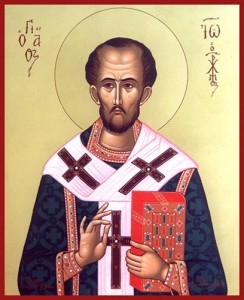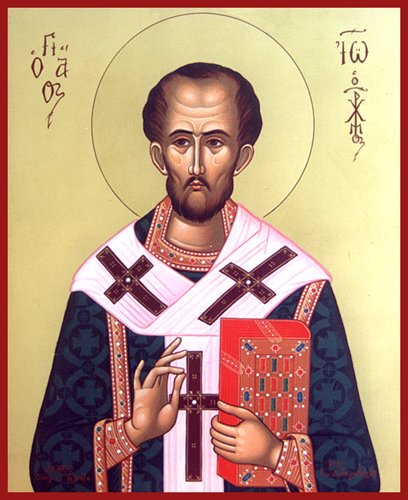[slide]
Today we continue our regular series called “Learning from the Saints.” Our guide is saint-expert Bert Ghezzi, a dear friend of mine and the author of numerous books including Voices of the Saints, Saints at Heart, and Adventures In Daily Prayer.
His newest book is Discover Christ: Developing a Personal Relationship with Jesus. You can learn more about Bert and his work at BertGhezzi.com.
Today, Bert explores the life of St. John Chrysostom, the fourth-century patron of preachers.
History has given St. John the nickname “Chrysostom,” or “Golden-mouthed”, because he was an unusually gifted speaker. Like Archbishop Fulton Sheen, a twentieth-century “Chrysostom,” he employed secular wisdom to reinvigorate the faith of Christians and to attract people to Christ. From his platform as patriarch of Constantinople, St. John wielded significant influence throughout the fourth-century Roman Empire.
 Even as a youth at Antioch, he excelled in oratory. Libanius, his mentor, said that he would have named John his successor, “had the Christians not snatched him from us.” Baptized at 20, John tried monasticism for six years. But his extremes nearly killed him, and he returned to the city in 381.
Even as a youth at Antioch, he excelled in oratory. Libanius, his mentor, said that he would have named John his successor, “had the Christians not snatched him from us.” Baptized at 20, John tried monasticism for six years. But his extremes nearly killed him, and he returned to the city in 381.
Bishop Flavian of Antioch ordained John a priest in 385. For the next dozen years he served as the bishop’s deputy, assigned as an ombudsman for the poor. In these years John earned his reputation as one of Christianity’s most outstanding pastors, preachers and expositors of the faith. He delivered extensive series of sermons on Matthew, John and Romans, using his skill as an exegete to help people apply biblical teaching correctly.
John’s constant theme was God’s inexhaustible mercy. He often coaxed sinners to repent, as he does here:
“Suppose that a believer who once was pleasing to God becomes full of wickedness and commits grievous sins that exclude him from the kingdom. I will not allow even a person like that to despair, although he may have grown old practicing his unspeakable wickedness.
“Now if the wrath of God were a passion, a person might well despair of quenching the flame that his many sins kindled. However, because the divine nature is passionless, God never punishes nor takes vengeance with wrath, but with tender care and much lovingkindness. So we must be of much good courage and trust in the power of repentance.
God does not punish for his own sake even those who have sinned against him, for nothing can harm that divine nature. Rather, to our advantage he acts to prevent our perverseness from worsening by our habitually neglecting him. Even a person who places himself outside the light inflicts no loss on the light. But shut up in darkness, he suffers the greatest loss himself. Similarly, he who habitually despises that almighty power, does no injury to the power, but inflicts the greatest possible injury on himself. And for this reason God threatens us with punishments—and often inflicts them—not as avenging himself, but by way of drawing us to himself.“
In 397, Emperor Arcadius had John appointed patriarch of Constantinople. Immediately, he set out to renew the church. Starting with himself, he cut his personal expenses, giving his savings to the poor. He imposed strict discipline on the clergy and called for the moral reform of the imperial court and the people.
John’s efforts made him many enemies, including Empress Eudoxia, who resented his condemnation of the frivolous behavior of women at court. Twice she conspired to have him banished. The second time, in 404, imperial officials forced St. John to walk in bad weather to a location in Pontus. He died en route of exhaustion on September 14.
(Image Credit: The Burning Bush)
Read more from Bert at his website www.BertGhezzi.com, or check out his many books on Amazon.
 |
 |
 |
 |

